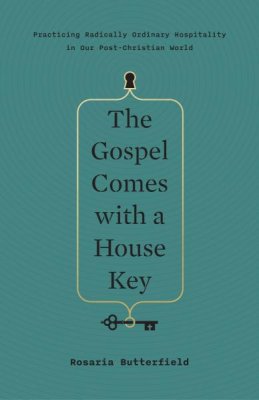The Gospel Comes With a House Key: Practicing Radically Ordinary Hospitality in Our Post-Christian World
By Rosaria Butterfield
–Review by Landrum P. Leavell III, ThD.
Oh my, where to start. This was one of the most layered books I’ve read in a long time. If you don’t know Rosaria Butterfield’s story, do some homework. She wrote The Secret Thoughts of an Unlikely Convert: An English Professor’s Journey into Christian Faith chronicling her story. She has also written Openness Unhindered: Further Thoughts of an Unlikely Convert on Sexual Identity and Union with Christ. She is a pastor’s wife and mother and a radical “hospitalitarian” (I just made that up).
There have been lots of good books coming out about this subject in the last few years: From Tablet to Table, The Art of Neighboring, and The Simplest Way to Change the World. This book plumbs another level. Many authors refer to and/or include their families from time to time in their books. Butterfield literally moves you into her life, home, family, church, and neighborhood. In the preface she writes, “If Mary Magdalene had written a book about hospitality for this post-Christian world, it would read like this one.” She doesn’t take you on a guilt trip or prescribe what you should do, but she invites you to think about how you might “let God use your home, apartment, dorm room, front yard, community gymnasium, or garden for the purpose of making strangers into neighbors and neighbors into family. Because that is the point—building the church and living like a family, the family of God.” (14)
Her own testimony is a tribute to how God worked through a couple who invited her into their home repeatedly. She intended just to use them for research, as she was an atheist doing a book on the Religious Right. Butterfield describes her own upbringing, again pointing to the amazing grace of God. For example, her parents believed in “equal-opportunity” porn, having both Playboy and Playgirl in the bathroom. She had a cousin who was the first owner of the Cathode Ray gay bar in Fort Lauderdale. Her parents took her there when she was twelve. She realized quickly that she had never seen a place like it. Her childhood made her wonder if God existed or cared. Caring neighbors could have helped her family.
This is not a cleaned-up picture of Christian suburbia. She begins with the story of the neighbor across the street who was not the neighbor they had prayed for, but the one God had planned for them. (He went to jail for turning the house into a meth lab.) She takes you through their journey of teenage adoption—seven thousand teenagers “age out” of foster care and often end up in prison, or homeless or dead. “Radically ordinary hospitality practiced by biblical Christians views struggling people as image bearers of a holy God, needing faith in Christ alone, belief in Jesus the rescuer of His people, repentance of life, and covenant family within the church.” (33)
This is a book about evangelism. “Practicing radically ordinary hospitality is your street credibility with your post-Christian neighbors. It allows you to listen, to keep secrets, to be a safe friend, and to speak a word of grace into dark places. In post-Christian communities, your words can be only as strong as your relationships.” (40) Butterfield tells real stories of inviting other neighbors to pray for the neighbor hauled off to jail, while police tape remained for days. Another story was told about the bad-weather Sunday when all the neighbors were invited to a “church service” in their home. Everyone had already been there numerous times for meals, counsel, et al, so those who would never darken the door of a church all came. Could it be that the key is something as simple as being invited in? “Our post-Christian neighbors need to hear and see and taste and feel authentic Christianity, hospitality spreading from every Christian home that includes neighbors in prayer, food, friendship, childcare, dog walking, and all the daily matters upon which friendships are built.” (95)
This is not a thirty-thousand-foot view but a street-level view of hospitality. She writes with passion and grit, and a big dose of reality. Intentionality is off the charts. This way of living takes planning, budgeting, and lots of forget-the-small-stuff, like clothes on the floor. Her personal testimony shows both the presence and the absence of hospitality.
Isn’t it ironic that most of us think that the service is over after the benediction is offered. The truth is, at the benediction, the battle begins. Every week. “My favorite day of the week is the Lord’s Day, and I want to share that day with others. Kent and I must open our home after worship to anyone who will come. We must. We remember what it is like to be a new Christian, to be single, to have secrets that get you alone and torment you, and to have no place to go after worship, the odd tearing apart of the body of Christ as each retreats to her own corner or clique while the benediction still rings in the air.” (111)
Bottom line? Rosaria Butterfield is leading us and asking us to bring the gospel home. I know what Jesus would do. Get it. Read it. Let it marinate in your heart and home.
You’re welcome.


Terrific review, Lan. Sounds like this might be a good “all church” read. I will blame you if I get in trouble for this…